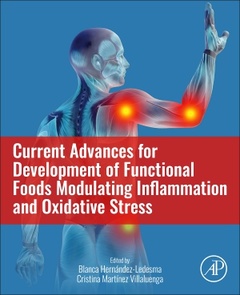Description
Current Advances for Development of Functional Foods Modulating Inflammation and Oxidative Stress
Coordinators: Hernandez-Ledesma Blanca, Martinez-Villaluenga Cristina
Language: English
Subject for Current Advances for Development of Functional Foods...:
Keywords
3D food printing; Acheta domesticus; Animal models; Antiaging; Antiinflammatory; Antiinflammatory activity; Antiinflammatory; Antioxidant; Antioxidant activity; Argentine native fruits; Bioaccesibility; Bioactive compounds; Bioactive peptides; Bioactive compounds; Bioavailability; Brassica; C-reactive protein; Cancer; Cancer prevention; Cereal grains; Cereals; Chronic diseases; Chronic inflammation; Cruciferous foods; Dietary agents; Dose–response; Edible insects; Emerging food technologies; Encapsulation; Fatty acids; Fermentation; Fermentation process; Fermented cereal grains; Food; Food components; Food proteins; Food-processing technology; Functional characteristics; Functional foods; Functional ingredients; Gastrointestinal diseases; Germinated cereal grains; Germination; Glucosinolates; Gryllodes sigillatus; Gut microbiota; Health effects; Helicobacter pylori; Hermetia illucens; Hormesis; Hormetic response; IL-1ß; In vivo antiinflammatory effect; In vivo antioxidative effect; Indoles; Inflammation; Inflammatory bowel disease; Intensified techniques; Intestinal mucosa; Isothiocyanates; Long-chain fatty acids; Marine macroalgae; Metabolic syndrome; Microbiota; Moringa oleifera; Musca domestica; Nervous system; Noncommunicable diseases; Nutraceuticals; Oxidative stress; Personalized food; Phenolic compounds; Phytochemicals; Polyphenols; Postbiotic; Prebiotic; Preconditioning; Probiotics; Selenium; Senescence; Short-chain fatty acids; Solvent extraction; Tenebrio molitor; Tumor microenvironment; Zinc
674 p. · 21.5x27.6 cm · Paperback
Description
/li>Contents
/li>Biography
/li>Comment
/li>
Current Advances for Development of Functional Foods Modulating Inflammation and Oxidative Stress presents the nutritional and technological aspects related to the development of functional foods with anti-inflammatory and antioxidant effects. Specifically, analytical approaches for the characterization of anti-inflammatory and antioxidant properties of healthy foods and functional constituents, as well as technological strategies for the extraction of compounds and fractions from raw materials to produce anti-inflammatory and antioxidant ingredients are addressed. In addition, the molecular mechanisms by which foods and their components can modulate inflammation and their oxidative stress effects on disease prevention are explored.
Finally, clinical research addressing nutritional needs in pathological subjects with inflammatory diseases are considered.
PART 1. DEVELOPING NEW FUNCTIONAL FOODS: AN OVERVIEW 1. Extraction and isolation of bioactive compounds from plants: A review on their pharmacological market value 2. Interplay between antioxidant and anti-inflammatory food-derived compounds 3. Design of functional foods by 3D printing 4. New functional foods: Marketing, consumer awareness and regulatory aspects 5. Ensuring the future of functional foods
PART 2. ANTIOXIDANT AND ANTI-INFLAMMATORY DIETARY COMPOUNDS 6. Polysaccharides as new functional ingredients 7. Omega-3 and -6 fatty acids in the spatial and temporal regulation of the inflammatory response 8. Bioactive peptides as modulators of inflammation and oxidative stress 9. Anti-inflammatory and antioxidant phenolic compounds 10. Terpenoids as inflammation and oxidative stress modulators 11. Anti-inflammatory and antioxidant micronutrients 12. Glucosinolates as regulators of inflammation
PART 3. NEW FOOD SOURCES OF ANTIOXIDANT AND ANTI-INFLAMMATORY COMPOUNDS 13. Micro and macroalgae as source of antioxidant and anti-inflammatory compounds 14. Findings on Whole-Grain Consumption and Biomarkers of Systemic Inflammation 15. Probiotics from research to market: the possibilities, risks and challenges 16. Insects as new source of anti-inflammatory and antioxidant compounds
PART 4. ADVANCES ON TECHNOLOGICAL APROACHES FOR THE PRODUCTION OF ANTIOXIDANT AND ANTI-INFLAMATORY INGREDIENTS 17. New delivery solutions for anti-inflammatory food ingredients 18. Advanced Extraction Techniques for retrieval of anti-inflammatory and antioxidant compounds from new plant sources 19. Biotechnological strategies to produce anti-inflammatory and antioxidant ingredients
PART 5. DIETARY ANTI-INFLAMMATORY AND ANTIOXIDANT COMPOUNDS: CLINICAL EVIDENCE IN DISEASE PREVENTION 20. Nutritional regulators of intestinal inflammation 21. Dietary pattern in relation to chemoprevention of neuroinflammatory disorders 22. Anti-inflammatory food compounds against cardiovascular diseases 23. Dietary chemopreventive compounds 24. Antioxidant and anti-inflammatory food compounds against metabolic disorders 25. Anti-Inflammatory effect of exercise mediated immune regulation
Dr. Cristina Martínez-Villaluenga is a Research Scientist at the Spanish National Research Council (CSIC) since 2010 with particular expertise in the development of biotechnological innovations to maximize the health benefits of underexploited plant-derived foods for their application as nutraceuticals and functional ingredients. In addition, the elucidation of the mechanism of action of food compounds in disease prevention and management is other of her research goals. She has B.S. Degrees in Biology and Food Science and Technology from the Complutense University of Madrid (Spain). After receiving her Ph.D. from the Automoma University of Madrid in 2006, she was a Marie Curie Postdoctoral Fellow in the Department of Food Science and Nutrition at University of Illinois at Urbana-Champaign between 2007 and 2009. Her current research is focused on the sustainable and cost effective production of novel bioactive peptides for prevention and management of hypertension, inflammatory diseases, obesity and metabolic diso
- Covers methods of analysis and extraction of anti-inflammatory and antioxidant compounds
- Offers an overview of the main anti-inflammatory and antioxidant compounds in foods
- Provides a guide on the mechanisms of action and health benefits of anti-inflammatory and antioxidant dietary bioactives
These books may interest you

Food Bioactives and Health 232.09 €



